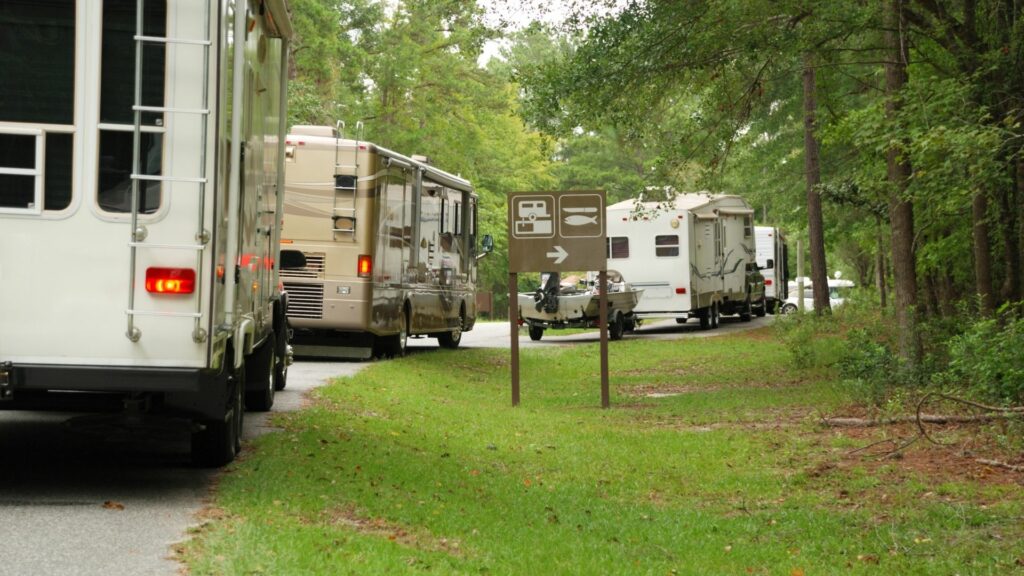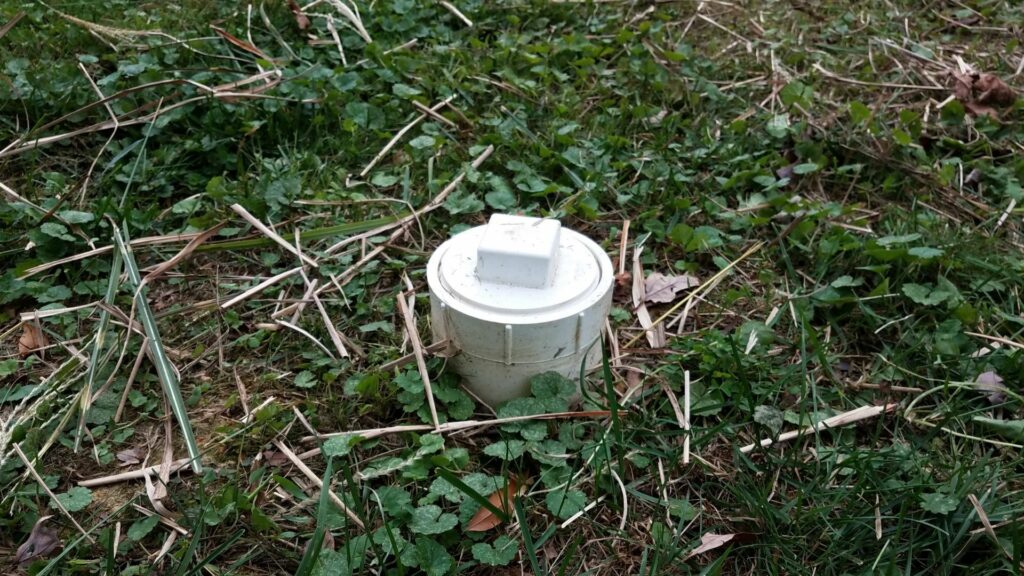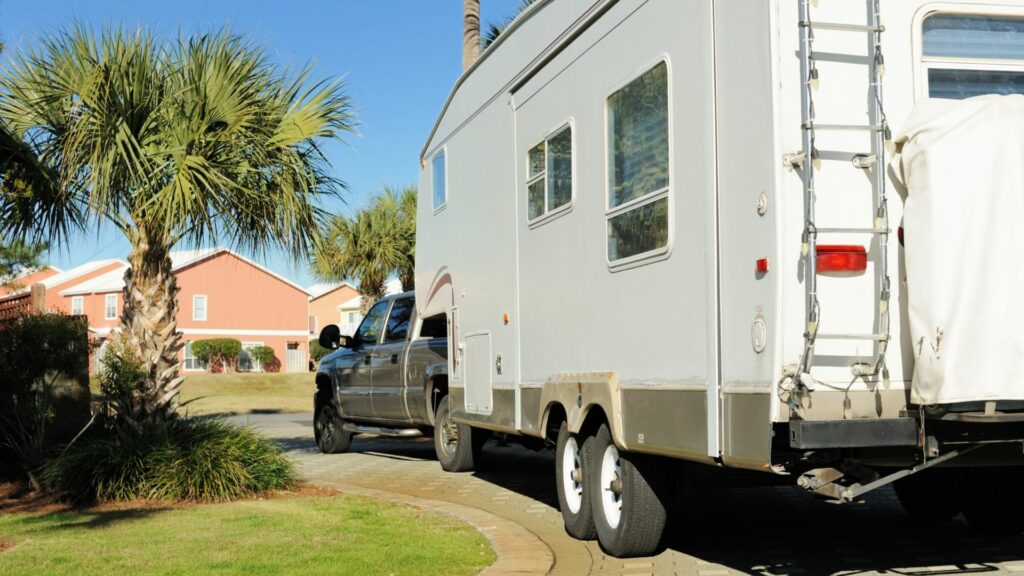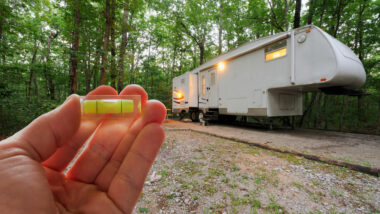Table of Contents Show
If you’ve ever tried leaving a campground on a Sunday afternoon, you’ve likely experienced the frustration of a long line at the dump station. However, we’re excited to share with you a few tips for how you could skip that line and dump your RV tanks at home.
Let’s take a look at a few things to consider so you can avoid the dump station and head straight home at the end of your camping trip. Let’s get started.

Can You Dump Your RV Tanks at Home?
Being able to dump RV tanks at home legally can depend on where you live. If you have a private septic tank and take the proper precautions, you likely won’t have much of an issue. This is because your septic tank will process the waste, and you’re not relying on public systems.
Relying on public systems can put some hurdles in your way when you try to empty your tanks at home. You’ll often run into local ordinances or regulations that you need to be aware of. If you’ve checked any local laws and have a green light, make sure to take the proper precautions to empty your tanks sanitarily.
Despite what Cousin Eddie may have taught us, dumping your tanks into a storm drain is never acceptable. You risk not only polluting water sources for plants, animals, and humans, but also a major fine. So make sure you dump your RV tanks properly at home.
Public vs. Private Sewer Systems
If your home uses a public sewer, you likely have a cleanout line. However, you’ll want to check with your local authorities to verify it’s okay to dump your tanks in the cleanout line. The cleanout line connection typically sticks out of the ground with a cap and leads to the main sewer.
Having a private sewer typically means you’ll have a septic system. A septic system processes both the solids and liquids which absorb into the ground. While it may initially seem unsanitary for waste to go into the soil eventually, it’s a very natural cleansing process. You’ll likely have access to the cleanout line and can easily empty your tanks.
Keep in mind that whether you have a public or private sewer system, the neighbors downwind of you may not appreciate the smells that blow their way while you dump. Be considerate of your neighbors and avoid emptying your tanks when they’re enjoying the outdoors. It may not be the best time if you notice them having a nice family picnic.
Can You Dump Your RV in a Street Storm Drain?
You should never dump your RV in a street storm drain. This is incredibly irresponsible, and you could incur a hefty fine. So save yourself the hassle of making enemies, keep your hard-earned money in your pocket, and make sure you only dump in approved places.
How to Locate Your Home’s Sewer Cleanout or Septic Hookup
The cleanout or septic hookup will likely be a short pipe that sticks out of the ground. This sewer connection will typically be near your home.
Take a walk around your property if you don’t know where the connection is. You’ll likely find it near a bathroom. Be sure to check behind bushes or other plans as they may hide it from your view.

How to Dump Your RV in Your Home’s Sewer Cleanout
Dumping your RV tanks at home while using your sewer cleanout can be incredibly easy. Let’s take a look at the steps you’ll want to check off while emptying your tanks. Let’s take a look.
Park as Close as Possible
Once you’ve located your sewer cleanout and made sure you can dump it, the next important task is to park as close as possible. This can help avoid needing large amounts of sewer hose and any issues with your tanks emptying efficiently.
Careful when parking your RV to dump. Watch out for sprinkler heads and the edge of your driveway to avoid causing damage to your lawn. It’s also important to be mindful of any mailboxes or decorations that could cause physical damage to your RV.

Use a RV Sewer Hose or Macerator Pump
Once you’ve parked your RV, you can grab your RV sewer hose or your macerator pump to start the dumping process. The location of your sewer cleanout will likely determine the best option for dumping your tanks.
Pro Tip: If your sewer cleanout is far away or uphill from your RV, a macerator pump will work great. Here are the best macerator pumps if you don’t have one yet.
Macerator pumps often give waste the assistance needed to reach your sewer cleanout connection. An RV sewer hose typically relies on gravity and force to carry the contents to the connection, which won’t work well if it’s further away or uphill.
Dump Like at a Dump Station
Once you connect to the sewer cleanout, you can dump your tanks like you typically would at a dump station. Most RVers will first empty their black tanks, then their gray tank, and finish with tanks for showers. This helps rinse out whatever hose you use while dumping.
Rinse Your Tanks While You’re at It
Since you’ve got everything connected and are likely not in a hurry, use the opportunity to give your tanks a good cleaning. This is much easier if you have a black tank flush connection on your RV, but you can flush your tanks even if your RV doesn’t have one.
After emptying your tanks, connect a hose to your black tank flush connection and ensure your tank valves are closed. Some RVers use a water meter to examine how many gallons of water they add to their black tank.
Pro Tip: Dealing with smells when you flush your RV toilet? Here’s how to stop the stink.
If you don’t have a gauge, you can allow the tank to fill up for a few minutes and open the valves to empty them. Keep an eye on the liquids as they drain into your sewer cleanout. You want to repeat this process for each tank until the fluid is relatively clear and free of any waste particles.
Clean Up When You’re Done
You should always clean up any mess after you finish. This helps avoid not only creating an unsanitary environment but also angering your neighbors. If they were upset by the smells blowing their way, you might annoy them more if they see you leaving a mess behind.
Not cleaning up could also get you in trouble with local authorities for improperly disposing of raw sewage. That’s a battle you likely don’t want to fight because it could end with you getting a fine or citation.
Dumping Your RV Tanks at Home Is Easier Than You Thought
Now that you know how easily you can dump your RV tanks at home, you may want to pass by those long lines at the dump station. Make sure you confirm the legality of emptying your tanks at home and have the necessary equipment to get the job done before you attempt it.
Do you dump your RV tanks at home or stick to the stations?







So far I’ve always dumped my tanks at home. I live in the country with a septic system. The clean-out connection is on the other side of the building where I usually situate the Class B van for dumping. If the ground is wet, I use a Flojet macerator and it does a fantastic job of pumping 60 feet if I’m on the far side of the building. If it hasn’t rained in several days I can drive to the other side and be within 10 feet. In any case, dumping at home is more “enjoyable” than at a park. I’m sure when I start taking longer trips I’ll have to use the campground’s station.